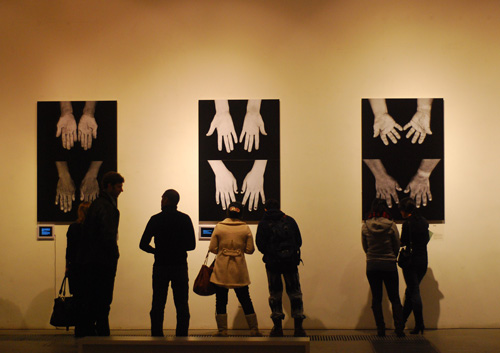Personalizing International Migrants Day
The life stories of migrant workers do not often make front page news. Most articles about migrants focus solely on their economic contributions, which are huge and indispensable. But it is important to highlight their individual stories for an even more profound reason. Their lives are just like ours—work, spending time with family and friends, and hoping and dreaming for the future. By learning more about them and their motivations, we find just how much our own lives have in common with theirs, and for this reason, we understand just how important it is to share their stories.
This year, Compassion for Migrant Children (CMC) and the Migrant Resource Network celebrated UN International Migrants Day (December 18) by doing just that. An event held at the T. Art Center in Beijing's 798 District on December 11 launched the photography exhibition "Substructure" that illustrates the lives of individual migrants and their families. As a member of Compassion for Migrant Children's staff, I have had the privilege to follow the development of this project. The fifty individuals highlighted in the exhibit stand for the 250 million migrants in China. They each send a profound message about the why this UN-declared holiday is important—each individual migrant has played a role in all of our lives.
 |
| Visitors at the exhibition [CMC photo] |
Through my visits to the community centers run by CMC, I have met some of the individuals whose stories are featured in "Substructure." One compelling young woman has demonstrated great perseverance despite her handicaps. When she was 15, a gas explosion left her hands and face permanently scarred. During her interview, she confidently asserted, "I don't give up easily even though it is tough to find jobs with my physical condition." I could feel nothing but admiration for her. She has the determination to succeed and to make a difference in a culture that places a great deal of emphasis on facial appearances.
Like this young girl, Beijing's migrants all have much to teach us about humanity. The children I met during my visits to migrant communities left indelible impressions. The first time I left the familiarity and convenience of central Beijing to travel past the 5th Ring, I was not prepared for the striking contrast between the neighborhoods I would be visiting and the ones that I lived and worked in every day. Slowly, the towering skyscrapers disappeared, replaced by dusty roads, run down buildings, and small shops. As we drove through the neighborhood, I noticed a large number of children walking home from school wearing colorful backpacks and uniforms. Some were running home to change from their uniforms into play clothes, while others, who were probably no more than ten, seemed to be wandering aimlessly on narrow sidewalks.
These were some of the same observations that the founder of Compassion for Migrant Children, Jonathan Hursh, made when he first visited a migrant community. In an article Hursh writes: "Children pay the highest price and are at risk of falling through the cracks of the Chinese system, as they have limited access to education, no support network in the new city, and parents working long hours every day."
 0
0 






